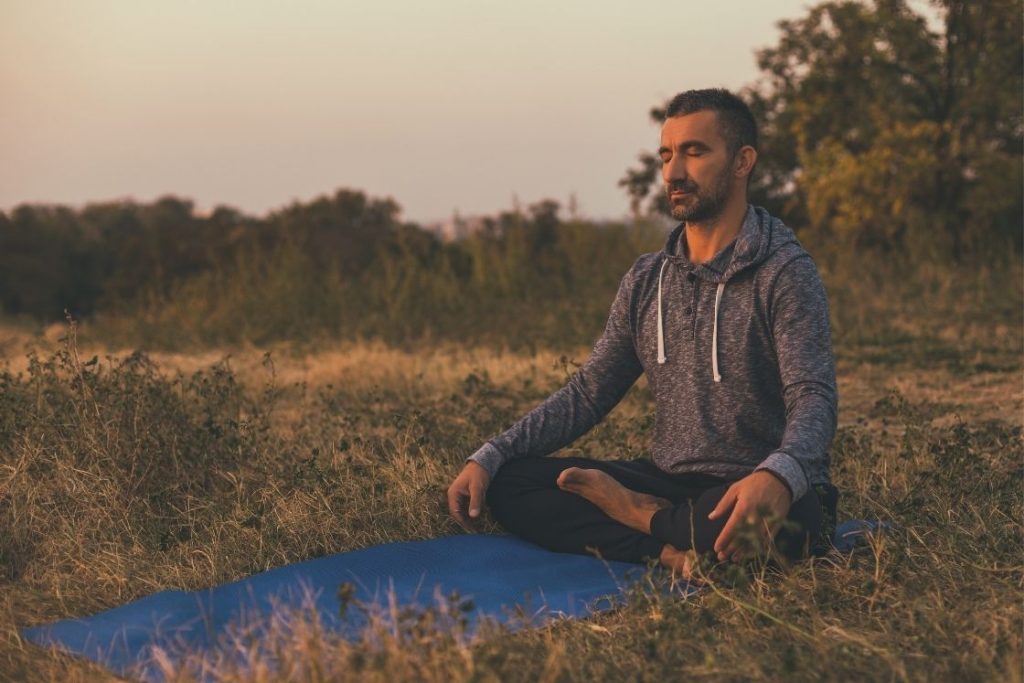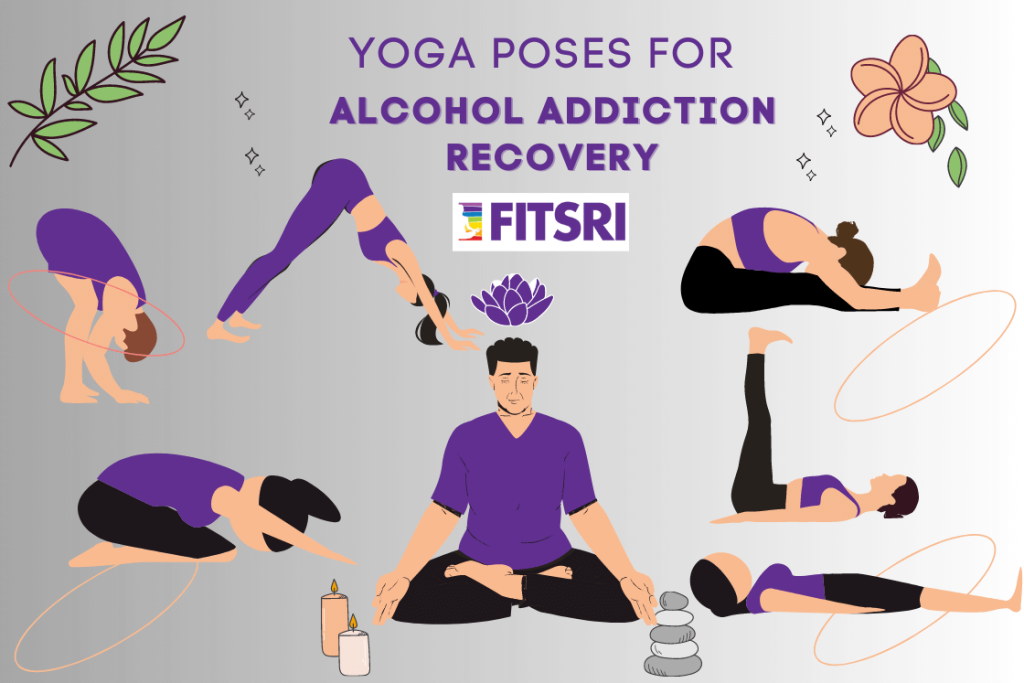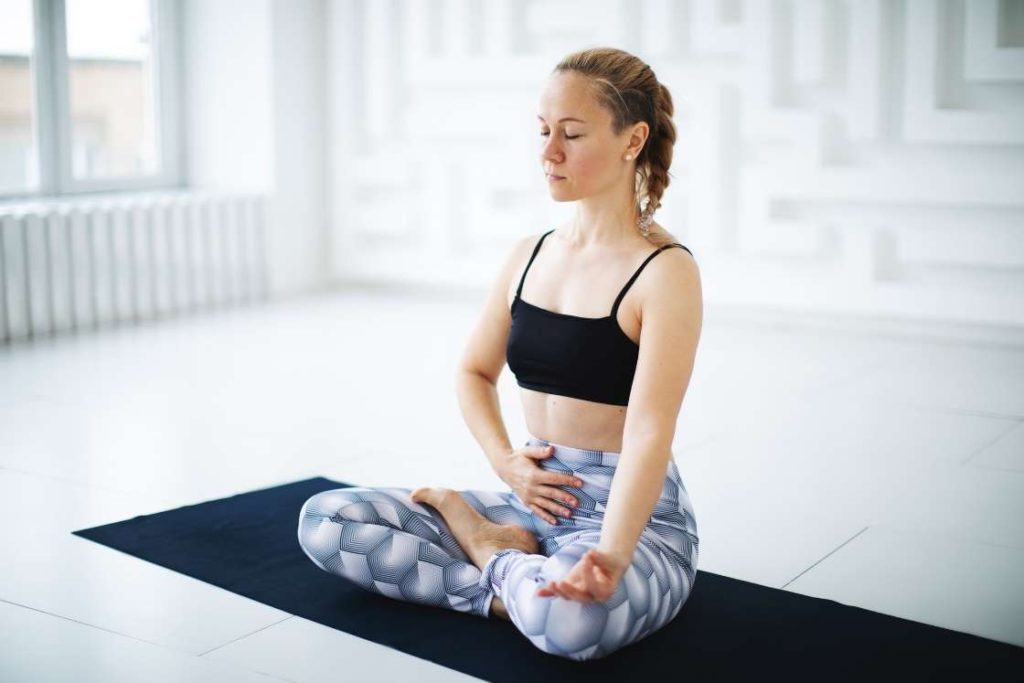- Alcohol Addiction
- Role of Yoga in Addiction
- Benefits of Yoga in Addiction Recovery
- Yoga Poses
- Pranayama
- Meditation

Alcohol addiction or any other substance addiction can ruin the lives of not only the addicted person but the people associated with them. Starting with one or two drinks at a party or with friends can become a bad habit of regular consumption in a blink of an eye. The person might not even realize that they are suffering from alcohol addiction unless they observe their behavior.
Modern science does have many techniques and therapies to help people come over from alcohol addiction. However, with an increase in demand for holistic and natural approaches, the use of yoga practices in assisting in curing addiction has also gained popularity.
It may sound odd to perform yoga, be it asana, pranayama, or meditation, to help with alcohol addiction as they do not seem to lie in the same plane.
While traditional therapies like counseling and medicine are successful in treating addiction and the co-occurring problems that it causes, mindful physical activity like yoga has recently come to be recognized as a viable supplementary health strategy.
But the important thing is to see the application of yoga from a different viewpoint.
How Alcohol Addiction Emerges?
People who are living a life of high stress, anxiety, depression, or mood disorders are prone to alcohol abuse and addiction. They use it as a coping method to block out reality and detach from the world and themselves.
It is used to relieve the tension and anxiety they are going through daily. Alcohol activates the brain’s reward circuits, which causes alcohol addiction to become a habit quickly. Their lives are affected by this dependency, as are their ties to loved ones.
The issue may cause catastrophic issues such as alcohol poisoning, violent behavior, accidents, chronic liver damage, high blood pressure, stroke, dementia, cancer, etc.
When an addict attempts to quit their harmful habit, their body experiences withdrawal symptoms. The unpleasant and debilitating withdrawal symptoms are a common barrier to quitting for people, who are also apprehensive about going experiencing them. At this point, people begin to slip into a destructive cycle.
Alcohol confines them in a concocted realm of deception and denial.
The Role of Yoga in Addiction Recovery
There are changed neural pathways after a period of alcohol or drug abuse. These neural networks are involved in pleasure perception, good judgment, impulse control, and emotional regulation. The propensity of the brain wiring to restore itself does exist after a period of abstinence from drugs or alcohol, and yoga can facilitate this process.
For alcoholics in recovery, regular yoga practice has a lengthy list of advantages for both physical and mental health, but one of the most significant advantages is the ability to recognize and deal with challenging emotions and issues such as PTSD, depression, anxiety, or stress.
A person addicted to alcohol needs to have control over their mind to even think of leaving this harmful habit. And yoga is known to help individuals gain control over their minds and behaviors.
Yoga practices like meditation can assist a new person find inner serenity by encouraging self-reflection while reducing the majority of external factors. It helps to relax and elevate their moods.
Holding poses or performing pranayama enhances your endurance and physical and mental strength, which are some of the crucial aspects needed when quitting alcohol addiction.
Moreover, inward reflection and positive change in the neural pathways encourage proper diet, a healthy lifestyle, and respecting one’s body
In addition to being used as a stand-alone practice, it can be advantageous as a component of a program for treating substance addiction. Yoga can be an excellent adjuvant therapy when performed in tandem with numerous other mainstream treatment techniques.
Benefits of Yoga in Addiction Recovery
Yoga can boost energy levels, inspire healthier eating habits, and enhance the quality of sleep that has possibly been hampered by alcohol withdrawal effects. Individuals are more equipped to deal with stress and any other issues that may arise throughout the day when they are physically healthier.
In this context below are the benefits of yoga practice for alcohol addiction:
Enhances awareness through internal introspection
Addicts who practice yoga can understand how to take onus for their feelings and achieve self-control over their activities. They might also develop greater independence and confidence in themselves as a result.
If a person is more acutely aware of their cravings, they may be better able to deal with and handle them by acknowledging them when they happen and not trying to suppress or cave into them.
Provides relief from stress
Practitioners in yoga practice learn to focus their attention inward, disengage from their senses, and pull their awareness from outward stimuli. This fosters a closer relationship with one’s inner self.
A person can set aside time each day for herself by doing yoga. In addition to being able to recover after getting through each day, individuals can also refresh their brains so that they can make better wise decisions. Individual gradually becomes increasingly dependent on themselves to find inner calm rather than on outside forces.
Enhances self-control
The prefrontal cortex, the brain region that is important for decision-making that has been damaged due to alcohol abuse, can be reconditioned by yoga. It aids in regaining a person’s ability to make choices.
In addition to helping the nervous system heal, yoga also helps people reduce their levels of stress and anxiety. Yoga practitioners eventually become proficient in a variety of breathing techniques that can be employed whenever tension or fear arises.
Help manage cravings and withdrawal symptoms
Yoga can significantly reduce cravings by promoting a calmer frame of mind. Yoga has also been demonstrated to naturally raise levels of the pleasure-inducing neurotransmitter following withdrawal when the brain is practically starved of the hormone.
This is essential because when you consume alcohol, your brain induces chemical reactions akin to pleasure which further becomes a catalyst for addiction. When your brain will produce such hormones on its own, you would not need the support of harmful substances to reduce pain, stress, and anxiety.
Improves quality of sleep
Techniques like yoga nidra, meditation, Sudharshan Kriya Yoga, and restorative yoga promote a calm and relaxed mind. They help recharge and refresh your brain by letting out any negative emotions and thoughts and relaxing your nervous system. All of this aids in giving you an uninterruptes and restful sleep.
Yoga Techniques for Alcohol Addiction Recovery
Yoga is indeed more than just performing poses. It encompasses pranayama (conscious breathing exercises) and meditation as well. When it comes to using yoga as a tool for alcohol addiction recovery, incorporating these elements can be highly beneficial. Here’s a breakdown of the different components:
Yoga Poses for Alcohol Addiction Recovery

Yoga poses, or asanas, can play a beneficial role in alcohol recovery by promoting physical and mental well-being. Here are some yoga poses that can be helpful:
- Downward-Facing Dog: This pose helps improve strength, flexibility, and circulation. It also relieves stress and calms the mind, promoting a sense of balance and grounding.
- Mountain Pose: Mountain pose is a foundational pose that helps improve posture, balance, and awareness of the body. It encourages stability and inner strength, supporting individuals in their recovery journey.
- Child’s Pose : Child’s pose is a gentle resting pose that promotes relaxation and stress relief. It allows for introspection and helps calm the nervous system, providing a sense of comfort and peace.
- Corpse Pose: Corpse pose is a pose of deep relaxation and surrender. It allows for complete rest and rejuvenation, promoting overall relaxation and integration of the benefits of the yoga practice.
- Seated Forward Bend: This pose stretches the back, hamstrings, and spine, relieving tension and promoting a sense of calm. It can also help improve digestion and reduce anxiety.
- Legs-Up-the-Wall Pose: This gentle inversion pose helps improve circulation, relieve fatigue, and reduce anxiety. It promotes relaxation and a sense of renewal.
- Surya Namaskar: Sun Salutation is a dynamic sequence of poses that combines movement, breath, and mindfulness. It helps energize the body, improve flexibility, and create a sense of inner balance and harmony.
Pranayama Practice for Alcohol Addiction Recovery

Pranayama, or conscious breathing exercises, can be beneficial for individuals in alcohol recovery by promoting relaxation, reducing stress, and enhancing overall well-being. Here are some pranayama techniques that can be helpful:
- Kapalbhati: Kapalbhati is a powerful cleansing breath that involves forceful exhalations and passive inhalations. It helps detoxify the body, increase energy levels, and improve mental clarity.
- Sitali: Sitali is a cooling breath that involves inhaling through a rolled tongue or pursed lips. It helps reduce body heat, calm the nervous system, and bring a sense of calmness and tranquility.
- Bhramari: Bhramari, also known as the bee breath, involves making a gentle humming sound while exhaling. It helps soothe the mind, reduce anxiety and anger, and promote relaxation and inner peace.
- Anulom-Vilom: Anulom-Vilom, also known as alternate nostril breathing, involves inhaling through one nostril and exhaling through the other. It helps balance the energy channels in the body, reduce stress, and enhance mental clarity and focus.
Meditation for Alcohol Addiction Recovery

- Practices such as chanting OM, mantra meditation, and mindfulness meditation complement the other yoga techniques.
- Meditation provides personal time for introspection and cultivates inner awareness.
Yoga Mudras for Addiction Recovery
Mudras are specific hand gestures that help direct energy flow and stimulate certain parts of the brain. Mudras such as Prana Mudra, Varun Mudra, Gyan Mudra, and Surya Mudra can be beneficial in the journey of alcohol addiction recovery.
Conclusion
Yoga detoxifies denial and promotes mental recovery. Through regular practice, yoga enables the individual to become more attuned to and aware of their body. Yoga has the potential to help someone become more in sync with both their body and their emotions. So take your time to move forward on the correct path.
The post Yoga for Alcoholism Recovery: Poses, Pranayama, & Meditation Practices appeared first on Fitsri.